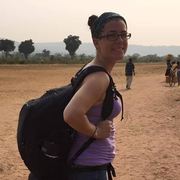 Emily Boshkoff is a practicing child psychologist in Northern Virginia, but her heart lies in the Midwest where she grew up. She loves working with children with autism and feels grateful for a career that she is passionate about. A perpetual world wanderer, she likes to write about places that are hard to find, either geographically or within ourselves. Her creative writing has been featured in Edgz, Etchings, and Hippocampus Magazine. Crater Lake It was like looking into the eye of God. A liquid, reverberating blue. It seemed like the water had never been rippled, like sewing with silk that resists creases, it slips and pours off the edge of your table, eluding the grasp of all but the most skilled seamstresses. I took a lover along who days before had violated my trust. She called it a “misunderstanding” then; we both said what we had to to preserve the weekend. It was June and the diamond sun glinted off snowy peaks. We bounded through drifts and built snowmen; we sunbathed at the peak. At the summit, we danced-- a slow, graceful unraveling; I could see everything. For days after, my skin was chapped red from frostbite and sunburn. Fire and ice in the same breath; we never had to choose our destruction after all. Salidas Highways here are bridges across oceans Of sandy soil and course grass, punctuated With crumbling thatched-roof huts. Freckled with bright green signs: Salidas a 500 metros. In the medians, brown men crouch like tiny bulkheads, Their machetes flashing in the sun, back and forth, Severing grass that’s gone belly up in the heat. Snub-nosed with tourist buses and missionary church vans Scuttle to and fro, while the working men Slap their leather-thick calloused feet against the pavement Jay-walking to the bus stop. They, with their bodies worn and broken in Like used baseball gloves, will return home To their beautiful lean wives. To watch their strong young sons Playing in the dusty colonias, running the jagged roads That are lie a thin, crooked scar Of a poorly-healed wound. La Route Rouge The north-south thoroughfare from Lubumbashi to Kamina. Everything is red. A fine crimson grit clings to every surface. With moisture it turns to paste, caking your boots, your clothes, a great, indelible smear across everything you own. In the rainy days, it becomes a great, seething, ankle-deep river of red, and you slog through, packages bound to your back, pushing your vehicle. It pulses in rivulets around your legs, reminding you of militia’s open season, when it really was blood. The mai mai lurched erratically along, laying waste to everything, leaving rivers of blood in their wake. Now, in summer, the air is hot, and sticky, and quiet. Red dust swirls in innocuous clouds. The sun, a bright red ball, hovers a moment, like a drooping eyelid, before smashing headlong into the horizon with a nuclear flash. It is dark in the instant. You can’t see the infamous redness of the road stretching before you—only hear the question throbbing in your own ears: which came first? The blood or the dirt? Geography I’m told the mountains of Kigali are unbearably green this time of year. But enough about blood. Bright sunny mornings in Nairobi belie little of tragedy. Did you hear they have autism in Kenya? This morning she is repeating something in Japanese, turning the words over and over on her tongue, letting them settle into their niche in her brain, where no one can reach her. In a flash of fury, her fingers dart out, carving a red riverbed of flesh in the smooth terrain of her teacher’s face. The great rift valley.
0 Comments
|
ArchivesCategories
All
|
 RSS Feed
RSS Feed